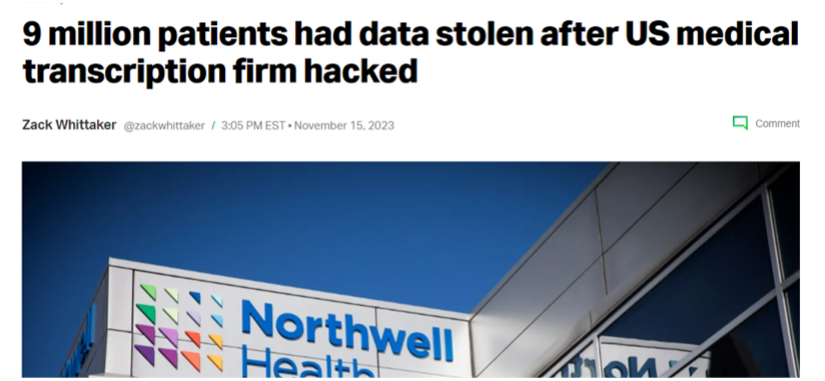

Background Summary
The cyberattack on Perry Johnson & Associates (PJ&A), a U.S. medical transcription company, resulted in one of the largest medical-related data breaches in recent times, with nearly 9 million patients’ sensitive information stolen. The breach, which began as early as March 2023, included patient names, dates of birth, addresses, medical and hospital account numbers, admission diagnoses, service dates and times, and in some cases, Social Security numbers, insurance, and clinical details. PJ&A started notifying affected patients on October 31. The breach has impacted multiple healthcare organizations, including Northwell Health and Cook County Health. Northwell Health confirmed that 3.89 million of its patients were affected, marking its second data breach this year. Cook County Health reported that 1.2 million of its patients were affected, including 2,600 records containing Social Security numbers.
Northwell Health, based in New Hyde Park, New York, is currently facing a class-action lawsuit due to the data breach. The lawsuit alleges that Northwell Health was negligent in protecting its patients’ protected health information. Despite Northwell Health’s systems not being directly affected by the cyberattack on PJ&A, the transcription service informed Northwell that files containing records of its patients were copied from PJ&A’s network.
Responsibility
Northwell Health, like any other healthcare provider, has the responsibility to ensure that its vendors, including those handling sensitive patient data, maintain high standards of security and data protection. This involves:
Conducting Due Diligence: Before engaging with a vendor, it’s essential for healthcare providers to assess the vendor’s data security measures, compliance with regulations like HIPAA, and their history of managing sensitive data.
Regular Audits and Monitoring: Continuously monitoring the vendor’s adherence to security protocols and conducting regular audits can help identify and mitigate potential security risks.
Contractual Agreements and Compliance: The contracts with vendors should include clauses that mandate strict compliance with data security standards and regulations. This includes requirements for immediate reporting of any breaches or security incidents.
Risk Assessment and Management: Regularly assess the risks associated with sharing patient data with third parties and implement measures to manage these risks.
Response Planning: Having a robust incident response plan in case of a data breach, including steps to mitigate damage, notify affected individuals, and comply with legal obligations.
In the context of the breach involving PJ&A, if Northwell did not adequately vet PJ&A’s security measures or failed to enforce strict compliance standards, they could potentially bear some responsibility for the breach, as indicated by the lawsuit filed against them. However, the specific legal responsibilities would depend on the details of their agreement with PJ&A and the extent of the due diligence conducted.
Reputation Management
It’s plausible that Northwell Health’s reputation could be impacted by the security breach involving Perry Johnson & Associates, especially considering the scale of the breach and the resulting lawsuit. Such incidents often raise concerns among patients about the safety and confidentiality of their personal health information. However, the actual extent of reputational damage would depend on various factors, including Northwell’s response to the breach, the effectiveness of its communication with affected patients, and the steps taken to prevent future incidents. These actions can influence public perception, media coverage, and public sentiment following the breach.
Best Practice- Prevention
Mandating HITRUST certification for vendors could potentially have helped Northwell Health in the context of the data breach involving Perry Johnson & Associates (PJ&A). HITRUST certification involves a comprehensive framework that integrates various standards and regulatory requirements, including those related to healthcare data protection. It provides a robust benchmark for data security and risk management.
Having this certification would mean that PJ&A would have had to meet high standards for protecting sensitive data, potentially reducing the likelihood of a breach. However, it’s important to note that while certifications like HITRUST can significantly enhance security postures, no system is entirely immune to cyber threats. Rigorous and continuous security practices and certifications are crucial for minimizing risks.
Choosing a vendor with HITRUST certification is a wise decision for any healthcare organization due to several compelling reasons:
Enhanced Trust and Credibility: HITRUST certification is recognized as a gold standard in healthcare data security. It demonstrates a vendor’s commitment to protecting sensitive health information and enhancing patient and stakeholder trust.
Comprehensive Security Framework: HITRUST integrates various security standards, ensuring that vendors are equipped to handle a wide range of security challenges and regulatory requirements, including HIPAA.
Reduced Risk of Data Breaches: HITRUST-certified vendors have undergone rigorous security assessments, significantly reducing the risk of data breaches and the associated costs and reputational damage.
Streamlined Compliance: Working with a HITRUST-certified vendor simplifies compliance management, as they already adhere to stringent healthcare data regulations.
Proactive Risk Management: These vendors are not just compliant at a point in time but are committed to continuous improvement and adaptation to evolving threats, ensuring long-term data protection.
In a landscape where data security is paramount, opting for a HITRUST-certified vendor is a strategic move towards safeguarding patient data, maintaining compliance, and upholding the healthcare organization’s reputation.
Ensuring Data Security in Healthcare: Learning from Northwell’s Incident and Choosing the Right Partners
The recent data breach at Northwell Health, impacting 3.9 million patients, is a stark reminder of the vulnerabilities in healthcare data security. This breach stems from a third-party vendor, Perry Johnson & Associates, highlighting the importance of choosing vendors with robust security credentials, particularly in areas as sensitive as patient information.
In light of such incidents, healthcare organizations must prioritize data security when selecting vendors, especially for crucial services like Telephone Answering. This is where MAP Communications, a leading provider in the field, stands out as a compelling choice.
Why MAP Communications?
Opting for a HITRUST-certified vendor, like MAP Communications, ensures enhanced trust and credibility, reduced risk of data breaches, streamlined compliance, and proactive risk management. This choice is crucial in a landscape where data security is paramount, helping healthcare organizations safeguard patient data, maintain compliance, and uphold their reputation in an increasingly digital and interconnected world.
Commitment to Security: MAP Communications, the first Telephone Answering Service to achieve HITRUST certification, understands the gravity of handling sensitive health information, ensuring rigorous compliance with healthcare data protection standards.
Proven Track Record: With a history of reliable service, MAP Communications has established itself as a trustworthy partner for healthcare providers.
Customizable Solutions: Recognizing the unique needs of healthcare organizations, MAP offers tailored services that align with specific operational requirements.
24/7 Support: Healthcare doesn’t stop; neither does MAP Communications, which offers round-the-clock service crucial for patient care continuity.
The Northwell incident is a cautionary tale for healthcare providers about the risks of third-party partnerships. It underscores the need to choose vendors like MAP Communications, which prioritize data security and offer reliable, customized support for healthcare organizations. By doing so, healthcare providers can safeguard sensitive patient data and maintain the trust of their patients and stakeholders.
Here are some related articles you might be interested in:
Nationwide vs Local Answering Service: Which is Best?
Eight Qualities and Skills to Look For in a Great Receptionist
5 High Impact Tips to Help Your Sales Team Close More Business


